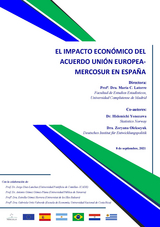External publications

El impacto económico del acuerdo Unión Europea - Mercosur en España
Latorre, María C. / Hidemichi Yonezawa / Zoryana OlekseyukExternal Publications (2021)
in: Ministerio de Industria, Comercio y Turismo
The EU-Mercosur Trade Agreement is the largest that the European Union has ever reached. We estimate its impact using a CGE with 41 sectors-4 factors-7 region (Spain, EU26, Brazil, Argentina, Paraguay, Uruguay and ROW), which includes two advanced features: 1) Climate of competition à la Melitz (2003) in various manufacturing sectors; and 2) Foreign multinationals in advanced service sectors, operating à la Krugman (1980). We calculate the initial and agreement-related CO2 emissions across regions. For year 16,
the agreement generates a small increase (0.14%) in CO2 emissions by the EU-Mercosur region which, however, translates into an improvement in the emissions/GDP ratio of the EU-Mercosur region (0,17% GDP increase) and for the world, as a whole.
Our results point out that this agreement is a “win-win” for its signatories. Everyone wins, but the impact will be more visible in the Latin American side. Our analysis of the total imports of the EU27 (i.e., jointly for the EU26 and Spain) shows that this agreement allows the Mercosur countries to export products in which they have a comparative advantage, while moving their export basket towards more complex products. It also allows the European side to improve its specialization in more complex sectors. Our results are generally higher than the ones in the literature. This is firstly because our
modeling includes components of the final agreement reached (Agreement in Principle of June 28, 2019) that, to our knowledge, have not yet been included in most previous studies, such as Foreign Direct Investment (FDI) in services and government procurement. Additionally, some of the previous studies focus on the effects for goods sectors, without including the impact on services. Moreover, our results would be much
smaller in a framework of perfect competition, as opposed to monopolistic competition à la Melitz (2003) in manufactures and to the imperfect competition à la Krugman (1980), adopted for the services sectors with multinationals.
Contact
Cornelia Hornschild
Publication Coordinator
E-mail Cornelia.Hornschild@idos-research.de
Phone +49 (0)228 94927-135
Fax +49 (0)228 94927-130
Alexandra Fante
Librarian/ Open Access Coordinator
E-Mail Alexandra.Fante@idos-research.de
Telefon +49 (0)228 94927-321
Fax +49 (0)228 94927-130



![[Translate to English:] Photo: Alexandra Fante, Bibliothekarin/Open Access-Koordinatorin](/fileadmin/_processed_/f/0/csm__c_Deutsches-Institut-fuer-Entwicklungspolitik_Fante_94ce4fa1ba.jpg)